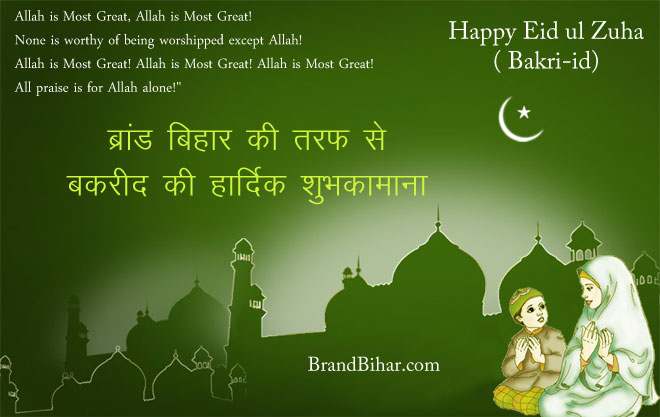Bakri-Id Bakr-id (the tradition of sacrificing a goat or 'bakr' in Urdu. The word 'id' derived from the Arabic 'iwd' means 'festival'), to be rightly called Id-ul-Azha and Id-ul-Zuha ( zuha comes from 'uzhaiyya' which translates to 'sacrifice'), is one of the most important Muslim festivals. This festival is observed and celebrated as a Festival of Sacrifice by Muslims all over the world. It falls on the 10th of Dhul-Hagg, the last month of the lunar year.
Bakrid is celebrated in commemoration of Abraham's willingness to offer his only son as a sacrifice at God's command. On this day, goats are sacrificed as an offering. Bakrid is celebrated with great enthusiasm and vigor among Muslims. Men and women dress up in new clothes and go to mosques. They offer special prayers or 'Dua' for the peace and prosperity of all Muslims. After the prayer, sacrifice is done. Muslims greet one another 'Eid Mubarak' and share their warmth. They visit relatives and friends and exchange gifts. Special delicacies and dishes are prepared and served amongst family and friends.
History
"That (is the command). And whoso magnifieth the offerings consecrated to Allah, it surely is from devotion of the hearts. Therein are benefits for you for an appointed term; and afterward they are brought for sacrifice unto the ancient House. And for every nation have We appointed a ritual, that they may mention the name of Allah over the beast of cattle that he hath given them for food; and your God is One God, therefore surrender unto Him. And give good tidings (Muhammad) to the humble. Whose hearts fear when Allah is mentioned, and the patient of whatever may befall them, and those who establish worship and who spend of that We have bestowed on them. And the camels! We have appointed them among the ceremonies of Allah. Therein ye have much good. So mention the name of Allah over them when they are drawn up in lines. Then when their flanks fall (dead), eat thereof and feed the beggar and the suppliant. Thus have We made them subject unto you, that haply ye may give thanks. Their flesh and their blood reach not Allah, but the devotion from you reacheth Him. Thus have We made them subject unto you that you may magnify Allah that He hath guided you. And give good tidings (0 Muhammad) to the good."' The above passage of the Koran has this foot-note of explanation : "The slaughter of animals for food for the poor which is one of the ceremonies of the Muslim pilgrimage is not a propitiatory sacrifice, but is in commemoration of the sacrifice of Abraham which marked the end of human sacrifices for the Semitic race, and which made it clear that the only sacrifice which God requires of man is the surrender of his will and purpose - i.e. Al-Islam." The sacrifice offered on the day of Idul-Adha has been instituted in commemoration of Abraham's willingness to offer up his only son Ishmael. The sacrificial offering is divided into three portions, one being set apart for household consumption, another for friends and relatives and the third for the poor and needy. The distribution of the offering enjoined by the holy Law is designed to provide a substantial meal to the poor on this festive occasion. The animal sacrifice can be offered on the first day of the festival or any time later till the afternoon of the third day following it. For four days on this occasion, i.e., from the morning of the ninth to the afternoon prayer of the fourteenth of Dhu'l Hijja, special praise and glory to God is recited after every prayer. The formula is this : Allah is Most Great, Allah is Most Great! None is worthy of being worshipped except Allah! Allah is Most Great! Allah is Most Great! Allah is Most Great! All praise is for Allah alone!"
|

